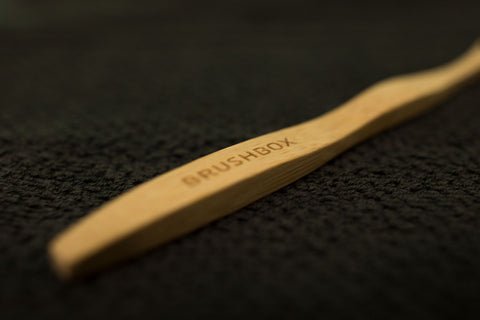Bamboo has become one of the most-used plants in the world, and rightly so!
To call Bamboo versatile would be something of an understatement - it has been used in furniture production, pulp and paper making, as a sustainable, renewable fuel (when it is made into charcoal) and the fibres are also regularly used for textile making.
Bamboo is also often used for beautiful flooring and as a core, raw material in the construction industry right across the world.
Cutlery and tableware are also often made from bamboo, including bowls, table mats, chopsticks, and forks and it has also been used in the medicinal and pharmaceutical industry too (phew!)
Here at Brushbox, given its considerable advantages & benefits we decided back in 2017 that we were going to use bamboo a sustainable, super eco-friendly material for our Brushbox Toothbrushes.

So, what are the benefits of using bamboo instead of plastic?
The short answer is that is has many of plastic’s strengths without any of its drawbacks.
Here are a few of the reasons we chose it…
1) Bamboo is a super sustainable product which can help to offset CO2 emissions.While its growing, bamboo is awesome at trapping CO2 (just like other trees and plants) and actively reduces the greenhouse gasses in our atmosphere. This proactively helps to slow down the pace of global warming.
2) It grows quickly, between 70mm and 450mm per day. Yep, you read that right, it’s often cited as the fastest growing plant in the world. Bamboo matures in just two to six years and its height is around 100 times its diameter. This has huge benefits for anyone wanting to use it as a sustainable crop.
3) It grows in natural environments.Bamboo does not undergo the lengthy and polluting production process that plastic undergoes. Plastics are made from and use up non-renewable natural materials like coal, natural gas, and crude oil which we can’t put back. Bamboo on the other hand grows naturally and can be sustainably replaced without damaging the environment. Substances called fractions are produced and each contains chains of hydrocarbon. One fraction called naphtha is crucial for plastics production. During the production process, plastic with long polymer chains is created using heat.
4) It doesn’t have to go through significant changes to become usable. Bamboo can be used in its natural form, significantly reducing the resources such as power and other ingredients needed to produce any item made from it. Plastic often comes from crude oil and before this can be used, it must be processed and distilled in a refinery, using a considerable amount of energy in the process and generating damaging waste material.
5) It is as durable, versatile, and strong, as plastic. This is one of bamboo’s greatest advantages. It’s a tough plant which mimics the durability of plastic without the significant drawbacks to the environment.
6) It’s biodegradable! This is the big one. Bamboo toothbrush handles can be recycled in your garden waste bin, home composter and even go in your food waste bin. If you put it in your garden or food waste bins, it will be collected by the council and put into an industrial composter. These industrial composters can completely decompose the bamboo in a few weeks. Compare that to a plastic brush - which are often not recycled by local councils and instead sent to landfill (or enter our waterways) where they will sit for hundreds of years unchanged.
Make one small change today which could make such a difference. Sign you & your family up to a bi-monthly bamboo subscription service here.


Well done, I hope others change from plastic to produce things out of bamboo too.